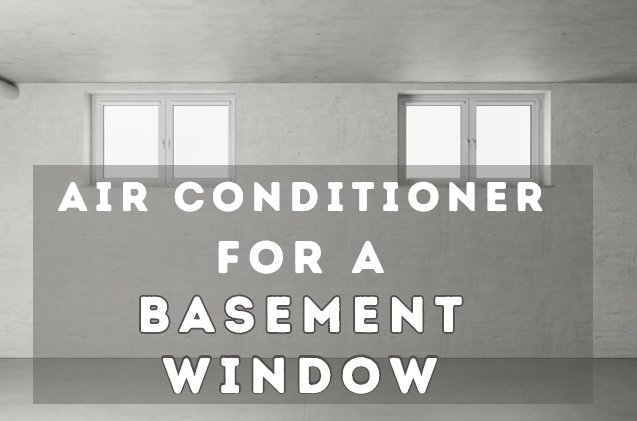Basements have evolved into versatile spaces that serve multiple purposes, from game rooms to home theatres. These underground spaces are no longer just storage areas. Thus, it’s imperative to ensure they remain comfortable.
While the natural insulation of being underground provides some temperature control, there are times when the air becomes stagnant or overly humid.
Enter the concept of air conditioning for basement windows, a solution that promises to maintain that perfect balance of comfort, ensuring our basements remain the go-to spot for relaxation and entertainment.
Why Basement Cooling is Important
Basements tend to be more humid and can trap heat, making them uncomfortable without proper cooling. Effective basement air conditioning is crucial for maintaining comfort, preventing mold growth, and ensuring good air quality.
Understanding Air Conditioner for a Basement Window
Basement window air conditioners refer to specific cooling systems designed to fit and function optimally in basement settings. Basements have unique characteristics; they’re partially or entirely underground, which can affect temperature and humidity levels.
Several types of air conditioners emerge as suitable contenders to cater to these specific needs. Each type has advantages, and the choice largely depends on the basement’s size, structure, and the homeowner’s preferences.
- Firstly, the window air conditioner is a compact unit that fits directly into the window frame. It’s a traditional choice but can be energy-intensive.
- Then we have the central air conditioner, which requires ductwork and can be more complex to install.
- Lastly, the portable air conditioner stands out for its flexibility and ease of installation.

Can You Put an Air Conditioner in the Basement?
Yes, you can install an air conditioner in a basement window. However, it’s essential to consider ventilation and safety. The basement window is a critical source of air circulation. So, you would want to avoid an AC unit blocking the emergency exit.
While placing an AC in the basement window is possible, it’s vital to ensure proper installation to avoid ventilation issues and potential safety hazards.
Read also: How to Install Portable Air Conditioner in Horizontal Sliding Window
Are Portable Air Conditioners Good for the Basement?
Absolutely! A portable basement air conditioner is a versatile solution for cooling. Their mobility allows homeowners to move them from one room to another or store them away after the hot season. Here are the other reasons why it’s suitable for your basement:
● Flexibility and Mobility
One of the most significant advantages of portable air conditioners is their mobility. You can quickly move them from one part of the basement to another, ensuring that specific areas or zones receive adequate cooling when needed.
● Easy Installation
Unlike window units or central air systems, portable air conditioners don’t require complex installation procedures. Most come with a simple window kit, allowing you to set them up near a window for ventilation.
This ease of installation means you can start cooling your basement immediately after purchase.
Research and Case Studies: According to HVAC experts, window air conditioners are among the easiest to install. A study found that most homeowners can complete the installation with basic tools and a little guidance.
● Cost-Effective
Compared to installing a complete central air system, especially in a home that doesn’t already have ductwork, portable units are a more budget-friendly option. They provide efficient cooling without the need for significant upfront investments.
● Energy Efficiency
Modern portable air conditioners are designed with energy efficiency in mind. They cool specific zones or areas, ensuring you are not wasting energy cooling the basement’s unused parts.
Window air conditioners are typically more energy-efficient and cost-effective compared to other cooling solutions. From my personal experience, installing a window unit in a basement provides targeted cooling without the need for extensive ductwork or modifications.
Tips from Expert: Look for units with a high Energy Efficiency Ratio (EER) or Seasonal Energy Efficiency Ratio (SEER). These ratings indicate better energy efficiency and can save you money on utility bills over time.
● Dehumidification
Basements are notorious for their dampness. Many portable air conditioners come with built-in dehumidifiers. While cooling the space, they also remove excess moisture from the air, ensuring a comfortable environment and reducing the risk of mold growth.
● Space-Saving Design
Portable air conditioners are designed to be compact, ensuring they don’t take up too much floor space. Their design allows for easy storage when they’re not in use.
Read also: Hisense Portable Air Conditioner Troubleshooting
Window vs. Portable Air Conditioners
| Feature | Window Air Conditioner | Portable Air Conditioner |
|---|---|---|
| Installation | Fixed, requires window | Flexible, can be moved |
| Cost | Generally lower | Higher initial cost |
| Cooling Efficiency | High | Moderate |
| Space Requirement | Minimal, occupies window space | Requires floor space and exhaust |
| Noise Level | Moderate | Higher |
| Maintenance | Moderate, clean filters regularly | Higher, manage exhaust and filters |
However, ensuring the unit has an exhaust fan in the window is essential for proper ventilation. While they offer many benefits, some models might produce noise, and specific designs might require proximity to a window for optimal functionality.
Choosing the right air conditioner for a basement window can significantly enhance the comfort of your living space. Whether you opt for a window unit, a portable air conditioner, or a ductless mini-split system, the key is to ensure proper installation and maintenance.


